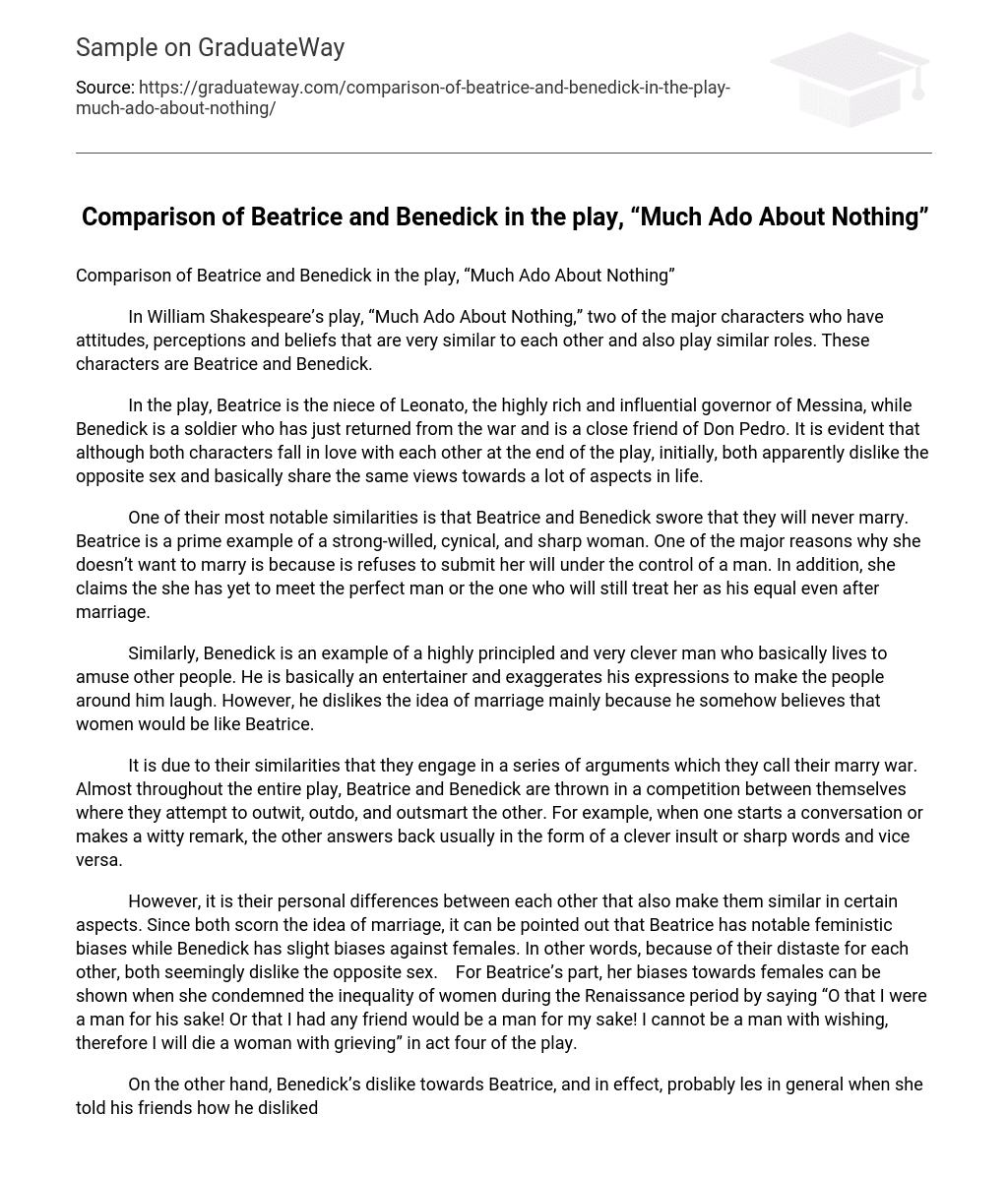In William Shakespeare’s play, Much Ado About Nothing,” Beatrice and Benedick are two major characters who share similar attitudes, perceptions, and beliefs. They also play similar roles.
In the play, Beatrice is the niece of Leonato, who is a highly rich and influential governor of Messina. Benedick, on the other hand, is a soldier who has just returned from war and is a close friend of Don Pedro. Although both characters fall in love with each other at the end of the play, initially they apparently dislike the opposite sex and share similar views towards many aspects of life.
One of the most notable similarities between Beatrice and Benedick is their vow to never marry. Beatrice exemplifies a strong-willed, cynical, and sharp woman. One major reason she refuses to marry is because she refuses to submit her will to a man’s control. Additionally, she claims that she has yet to meet the perfect man who will treat her as an equal even after marriage.
Similarly, Benedick is an example of a highly principled and clever man who enjoys amusing others. He often exaggerates his expressions to make those around him laugh, functioning as an entertainer. However, he dislikes the idea of marriage because he believes that women would be like Beatrice.
It is due to their similarities that Beatrice and Benedick engage in a series of arguments which they call their merry war.” Throughout the play, they are constantly competing with each other, attempting to outwit, outdo, and outsmart one another. Whenever one starts a conversation or makes a witty remark, the other responds with a clever insult or sharp words. This back-and-forth banter continues almost non-stop.
However, it is their personal differences that make Beatrice and Benedick similar in certain aspects. Both scorn the idea of marriage, which reveals Beatrice’s notable feminist biases while Benedick has slight biases against females. In other words, because of their distaste for each other, both seemingly dislike the opposite sex.
For Beatrice’s part, her biases towards females are evident when she condemns the inequality of women during the Renaissance period by saying O that I were a man for his sake! Or that I had any friend who would be a man for my sake! I cannot be a man with wishing; therefore, I will die a woman with grieving” in Act Four of the play.
On the other hand, Benedick dislikes Beatrice and probably women in general. He expressed this dislike to his friends by saying, Will your grace command me any service to the world’s end? I will go on the slightest errand now to the Antipodes that you can devise to send me on. I will fetch you a toothpicker from the furthest inch of Asia… do you any embassage to the pigmies, rather than hold three words’ conference with this harpy” in Act II of the play.
However, despite their differences, both characters shared the same sympathy for Hero. When her fiancé Claudio wrongfully accused her of being unfaithful and left her at the altar on their wedding day, Beatrice lashed out at him for mistreating her cousin. Meanwhile, Benedick challenged Claudio to a duel.
Their common sympathy towards Hero and her failed relationship with Claudio speaks volumes about Benedick and Beatrice’s apparent frustration towards marriage, and even love itself. This means that although they both dislike the very thought of matrimony, deep down, they long for someone to love and share their life with.
Furthermore, since Beatrice and Benedick fell in love and eventually got married at the end of the play, it can be concluded that the only person who could make them change their initial idea of marriage was each other. In short, they are similar in the sense that they needed each other to change their views and perceptions.





